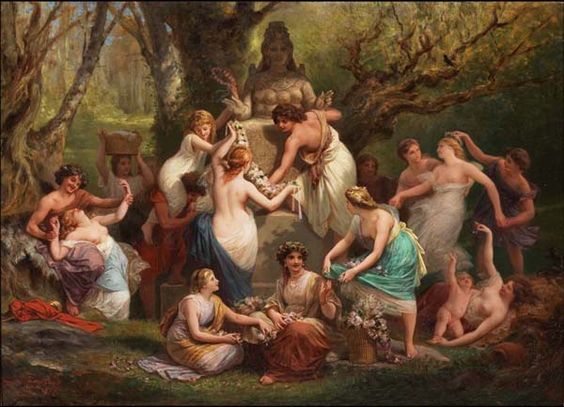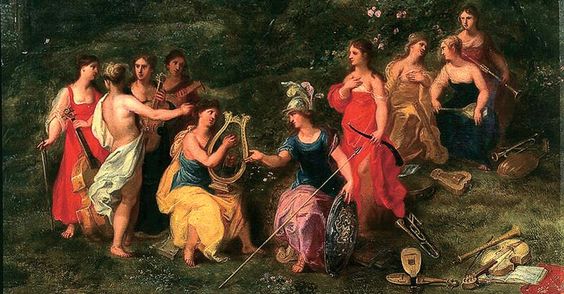
The space of mythology in literature is a rich and varied one, encompassing a wide range of cultures, traditions, and stories
SHOUKAT LOHAR
Mythology is a vast and complex field of study that has fascinated people for centuries. It is the study of traditional stories, beliefs, and legends that have been passed down through generations. These stories often involve gods, goddesses, heroes, and monsters, and they are used to explain the origins of the world, natural phenomena, and human behavior. Mythology has played a significant role in shaping the literature of various cultures, and it continues to be a fascinating subject for writers and readers alike.
Definition of Mythology
Mythology is a term that refers to the collection of traditional stories, beliefs, and legends that are passed down through generations. These stories often involve supernatural beings such as gods, goddesses, heroes, and monsters, and they are used to explain the origins of the world, natural phenomena, and human behavior. Mythology is an important part of many cultures and has been used to explain everything from the creation of the universe to the customs and traditions of a particular society.
Greek Mythology
Greek mythology is perhaps the most well-known and widely studied mythology in the world. It is the collection of stories and legends from ancient Greece that involve the gods and goddesses of that culture. Greek mythology is filled with tales of powerful gods such as Zeus, Poseidon, and Hades, as well as brave heroes like Perseus and Theseus. These stories have been retold countless times in literature, from the epic poems of Homer to the plays of Sophocles and Euripides.
Gods and Goddesses
The gods and goddesses of Greek mythology are perhaps the most famous figures in the mythology of any culture. These powerful beings were believed to control the natural world and to have a significant impact on human life. The most well-known gods and goddesses of Greek mythology include Zeus, the king of the gods; Poseidon, the god of the sea; Athena, the goddess of wisdom; and Aphrodite, the goddess of love.
Latin Mythology
Latin mythology is the collection of stories and legends from ancient Rome that involve the gods and goddesses of that culture. Latin mythology is similar to Greek mythology in many ways, and many of the gods and goddesses of the two cultures are closely related. Some of the most well-known gods and goddesses of Latin mythology include Jupiter, the king of the gods; Venus, the goddess of love; and Mars, the god of war.
Egyptian Mythology
Egyptian mythology is the collection of stories and legends from ancient Egypt that involve the gods and goddesses of that culture. Egyptian mythology is unique in many ways, and the gods and goddesses of this culture often had animal heads and bodies. Some of the most well-known gods and goddesses of Egyptian mythology include Ra, the sun god; Anubis, the god of death; and Isis, the goddess of magic and fertility.
Indian Mythology
Indian mythology is the collection of stories and legends from ancient India that involve the gods and goddesses of that culture.
Indian mythology is incredibly diverse, with many different gods and goddesses playing significant roles in the stories. Some of the most well-known gods and goddesses of Indian mythology include Vishnu, the preserver of the universe; Shiva, the destroyer of the universe; and Kali, the goddess of death and destruction.

Space of Mythology in Literature
One of the key reasons for the enduring appeal of mythological stories is their ability to speak to universal themes and experiences. Writers have long been drawn to the powerful archetypes and symbols found in myth, using them to explore fundamental questions about the human condition. These stories offer insights into the nature of love, death, power, and morality, and they provide a framework for understanding the complexities of the human experience.
Perhaps the most famous example of mythological storytelling in literature is the work of the ancient Greek poet Homer. His epic poems, the Iliad and the Odyssey, tell the story of the Trojan War and the adventures of the hero Odysseus as he tries to make his way home. These works are filled with gods and goddesses who intervene in the lives of mortals, shaping the course of events and testing the limits of human endurance. Homer’s poetry has been a touchstone for writers throughout history, inspiring countless adaptations, retellings, and interpretations.
Perhaps the most famous example of mythological storytelling in literature is the work of the ancient Greek poet Homer
Another example of the enduring appeal of myth in literature can be seen in the work of J.R.R. Tolkien. The Lord of the Rings trilogy draws heavily on Norse and Celtic mythology, creating a rich and complex world filled with elves, dwarves, wizards, and other magical creatures. Tolkien’s use of mythological themes and symbols gives his work a sense of depth and resonance that has captivated readers for generations.
In more recent times, writers such as Neil Gaiman and Rick Riordan have continued to draw on the power of mythology in their work. Gaiman’s American Gods tells the story of a battle between the old gods of myth and the new gods of modern society, exploring themes of identity and belief. Riordan’s Percy Jackson series, meanwhile, updates the myths of ancient Greece and Rome for a contemporary audience, creating a thrilling adventure story that is both entertaining and educational.
Conclusion
The space of mythology in literature is a rich and varied one, encompassing a wide range of cultures, traditions, and stories. Whether exploring the epic tales of ancient Greece or the magical worlds of Norse mythology, writers have found inspiration in the myths of the past, using them to create works of art that speak to the human experience across time and cultures. Through their use of archetypes, symbols, and themes, these stories continue to resonate with readers, offering insights into the mysteries of the human condition that are as relevant today as they were thousands of years ago.
________________
 Shoukat Lohar is Assistant professor in English at Mehran University of Engineering and Technology Jamshoro. He can be reached at Shoukat.ali@faculty.muet.edu.pk
Shoukat Lohar is Assistant professor in English at Mehran University of Engineering and Technology Jamshoro. He can be reached at Shoukat.ali@faculty.muet.edu.pk